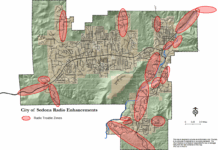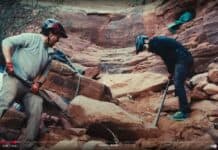Sedona City Council agreed to move ahead, in order to plan ahead, for the future disposal of the city’s treated wastewater.
On Feb. 24, council voted 6-1 to grant Carollo Engineers a $152,125 contract to begin seeking necessary permits for an aquifer recharge project at the city’s wastewater treatment plant.
Councilwoman Pud Colquitt voted against the motion, stating the city is acting piecemeal, which she called “dangerous and expensive.”
The awarded amount will allow Carollo to look at options to dispose of the city’s effluent, primarily focusing on injection wells.
Carollo will determine if the city’s wastewater plant is a feasible site for an injection well, the feasibility of selling or using water credits and how much it would cost the city to upgrade the plant to A+ treatment.
The engineers will also work with the city’s Wastewater Effluent Disposal Land Use Task Force on options other than injection wells. The contract came as a result of a May 2008 Burgess & Niple water reuse study.
After learning the results of the study in July 2008, council directed staff to begin the process, including seeking permits, for an aquifer recharge/water reuse project.
The wastewater plant currently takes in 1.1 million to 1.2 million gallons per day and has the capacity to dispose of 1.6 million gallons of effluent per day.
If the entire city were connected to the plant, the estimated average daily flow would be about 2 million gallons per day.
Although the plant has capacity to take in and treat the estimated 2 million gallons per day, it does not have the capacity to dispose of 2 million gallons of effluent daily.
Carollo originally proposed a contract for $921,932, which could be broken up into six phases and would look at putting injection wells at the wastewater plant or on one of two state land sites — Sheepshead Wash or Gyberg Wash. If Carollo determines the wastewater treatment plant is not a feasible site for an injection well, council could approve a new contract for them to look at the two state land sites.
Building injection wells at the state land sites would require leasing state lands — $250,000 per acre for 20 years — and installing $1 million in piping to get the effluent from the plant along Highway 89A to the site.
Task 410 Under Task 410, Carollo will determine the cost of upgrading the wastewater plant’s effluent from B+ to A+, which would allow the city more options for disposal.
Carollo will coordinate with the Arizona Department of Environmental Quality to determine if Sedona must upgrade to A+ for an injection well at the plant due to its proximity to Oak Creek.
According to Interim City Manager Alison Zelms, the city’s plant, and either of the state lands sites, may require A+ treated effluent for injection.
“We have a B+ plant but we already have things that would make it easier to get to A+ than other plants,” Zelms said. “So it’s a bit of an unknown.”
Task 431 and 431B Carollo will determine the feasibility of the city’s wastewater treatment plant location for an injection well. Under this task, the engineers will work with ADEQ, Arizona Department of Water Resources, Arizona Geological Survey and the U.S. Geological Survey.
The study will determine the applicability of the soils for injection, potential impacts on existing groundwater, the depth of the aquifer, and it will solidify test drilling parameters.
If the site is not feasible, the city could approve another contract with Carollo to do the same study at one or two state lands sites.
Task 500 Carollo will do an evaluation to determine the city’s interest in water credits. Although Sedona does not have a direct need to reuse its effluent, there are communities around the state that may be interested in purchasing the city’s water credits.
“We could inject into the ground without water credits or we could inject and get water credits for the future,” Director of Public Works Charles Mosley said.
According to Mosley, the city could draw out what it put in at a later date, or another city or agency could draw out the water after buying Sedona’s water credits. Task 600 Carollo will advise the city on its options.





















